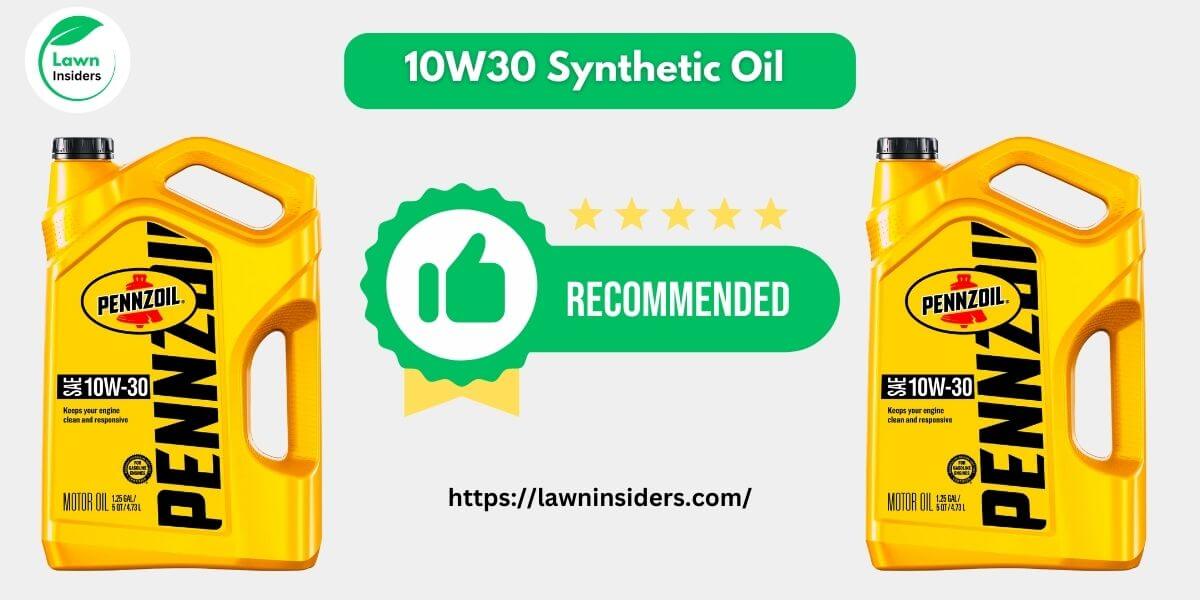For many years lawnmowers, automobiles, trucks, and SUVs have all utilized the same multi-grade engine oil known as 10W30.
This oil is a combination of two viscosity grades—10W and 30. To maximize safety and performance throughout a wide range of temperatures.
The “W” in 10W30 refers to the year’s colder months. While the numbers before and following the “W” denote the oil’s viscosity at warmer temperatures.
This implies that 10W30 oil has a lower viscosity at cold temperatures, facilitating the easier flow and greater cold-start protection. And a higher viscosity at higher temperatures, enhancing protection against engine wear.
There is a perfect medium between fuel economy, engine protection, and performance with 10W30 oil, making it suited for most engines.
To assist you in deciding whether or not 10W30 oil is ideal for your car, we’ll go through its characteristics, benefits, and drawbacks in this review.

why should you use 10W30 Oil?
When it comes to small engines, such as those found in lawnmowers, it’s best to use 10W30 motor oil.
This multi-grade oil is particularly useful at low temperatures to prevent wear and tear. The “10” in the name refers to the oil’s low-temperature viscosity rating.
While th” refers to its high-temperature rating. There are several advantages to using 10W30 in your lawn mower.
To begin with, it may aid with the maintenance and protection of your engine, keeping it operating smoothly and longer.
In addition, 10W30 is a multi-grade oil, so it is suitable for use all year round. Because it offers protection in a broad temperature range, it’s best to go with an oil made for smaller engines.
Suppose you want to keep your lawnmower running smoothly. The adaptability and efficiency of 10W30 make it a popular pick. But you should always check your owner’s manual or visit an authorized repair shop to find the right oil for your lawnmower model.
Customers Rating
The overall customers rating is:
5,570+ reviews
Specifications:
In-depth Features:
Multi Grade:
10W30 oil blends two viscosity grades, offering better protection in different temperature conditions.
Cold Start:
10W30 oil has a low viscosity at low temperatures, allowing it to flow easily and providing better cold-start protection.
High Temperature:
10W30 oil has a higher viscosity at high temperatures, providing better engine protection against wear and tear.
Fuel Efficiency:
10W30 oil can improve fuel efficiency by reducing engine friction and improving engine performance.
Engine Protection:
10W30 oil protects against engine wear, corrosion, and deposits, extending engine life.
Compatibility:
10W30 oil is compatible with most gasoline and diesel engines, making it a versatile oil for use in various types of vehicles.
Environmental Friendly:
10ycled and disposed of properly, making it an environmentally friendly choice.
Synthetic Option:
10W30 synthetic oil performs better in extreme temperatures and severe driving conditions.
Seal Conditioner:
Some 10W30 oils contain a seal conditioner that can help to reduce and prevent leaks in older engines.
Oxidation Stability:
10W30 oil has excellent oxidation stability, providing longer oil life and better engine protection.
Viscosity:
10W-30, oil has a viscosity of about 150 CST (centistokes) at 100°C. This makes it an intermediate viscosity oil that is suitable for use in engines that may be exposed to a wide range of temperatures and operating conditions.
Viscosity Index:
10W-30 oil has a viscosity index of around 100. This means that its viscosity is relatively stable over a wide temperature range, making it suitable for use in engines that may be exposed to a range of operating temperatures.
Performance Classification:
10W-30 oil is classified as a multi-grade oil, with a performance rating of “10W-30.” This means that it meets the minimum viscosity requirements for use as a 10W-30 oil at low and high temperatures.
Additives:
10W-30 oil typically contains additives such as detergents, dispersants, and anti-wear agents to help improve their performance and extend their lifespan. These additives may vary depending on the specific brand and formulation of the oil.
Pros and Cons:
Pros
-
Provide better cold-start protection
-
Offers improved fuel efficiency
-
Protects against engine wear and tear
-
Provides excellent engine protection
-
Compatible with most engines
-
Offers synthetic options for better performance
-
Can contain seal conditioner to prevent leaks
-
Environmentally friendly option for recycling and disposal
-
Provides longer oil life
Cons
-
May not be suitable for extreme temperature conditions
-
May not be suitable for use in some newer engines
-
May not be suitable for certain diesel engines
10W30 Buying Guide:
The engine type, operating circumstances, and manufacturer’s recommendations. When choosing a 10W30 oil for your lawnmower, you should keep all these things in mind.
For a detailed buying guide, click here.
Can 10w30 be used successfully in lawnmowers?
A lawnmower owner’s most common question is whether or not 10W30 oil may be used in their mower. The engine oil 10W30 is suitable for various machinery, including lawnmowers.
Lawnmowers can benefit from the enhanced fuel efficiency, greater cold start prevention, and enhanced engine protection that this feature offers. However, you should know that not all mowers can use 10W30 oil.
It is important to check the manufacturer’s specs before putting any oil into your lawnmower, as some manufacturers advocate using a specific type of oil for their engines.
It’s also worth noting that 10W30 oil could not function as effectively as other oi or 10W40 under extremely hot or cautions. In general, 10W30 oil is a superb choice for offering outstanding engine protection and performance.
Is using 10w30 risky for the lawnmower's engine?
If your lawnmower provider recommends using 10W30, you can use it without worry. However, the engine will suffer long-term harm if the incorrect oil is used.
Oil type and viscosity recommendations for your engine usually are in the owner’s handbook or by contacting the manufacturer. Engine wear, overheating, and diminishing performance are all possible outcomes of using oil of the incorrect viscosity.
The heavier consistency of 10W30 oil at low temperatures also makes it more challenging to start the engine in extremely cold conditions.
It is very important to use oil of the correct type and viscosity for the lawnmower’s intended use. If you want your engine to last and run well, you must replace the oil and regularly perform preventative maintenance.
Before choosing an oil type and viscosity for your lawnmower, be sure to consult the owner’s handbook or manufacturer’s recommendations.
Conclusion:
In conclusion, 10w30 is a preferred oil for lawnmowers and other engines. Its viscosity makes it suited for varied temperatures and balances protection and performance.
To optimize engine performance, use high-quality oil that meets manufacturer requirements and change it regularly. 10w30 lubricates and protects lawnmower engines, making them more efficient and durable.
Frequently Asked Questions (FAQs):
Can 10W30 be used in diesel engines?
The manufacturer’s recommendations for the specific engine should be checked before using 10W30 in some diesel engines.
Is 10W30 better than 5W30?
A manufacturer’s recommendation and the application determine whether it is appropriate. Using 10W30 for high-temperature applications may be better, while 5W30 for cold-weather applications.
Can 10W30 be used in two-stroke engines?
Because 10W30 does not mix with gasoline like two-stroke oil, it cannot be used in two-stroke engines.
Is 10W30 suitable for high-mileage engines?
It is recommended that high-mileage engines use 10W30 oil since it contains additives that help reduce engine wear.
Can 10W30 be used in a lawnmower?
Some lawnmower engines can use 10W30, but it is important to check the manufacturer’s recommendations.
How often should I change the 10W30 oil in my car?
The manufacturer recommends changing the oil every 5,000 to 7,500 miles.
Is synthetic 10W30 better than conventional 10W30?
Compared to conventional 10W30, synthetic 10W30 may perform better and provide better protection in extreme temperatures and high-stress situations.
Can 10W30 be mixed with other oils?
In general, mixing different types of oil, including 10W30, can harm the engine and affect its performance.
Is 10W30 suitable for winter use?
In some climates, 10W30 can be used in winter, but you should check the manufacturer’s recommendations.
Is it okay to use 10W30 oil on my motorcycle?
A motorcycle’s manufacturer’s recommendations and the motorcycle itself will determine what is appropriate. Oil viscosity or type may be specific to some motorcycles.







